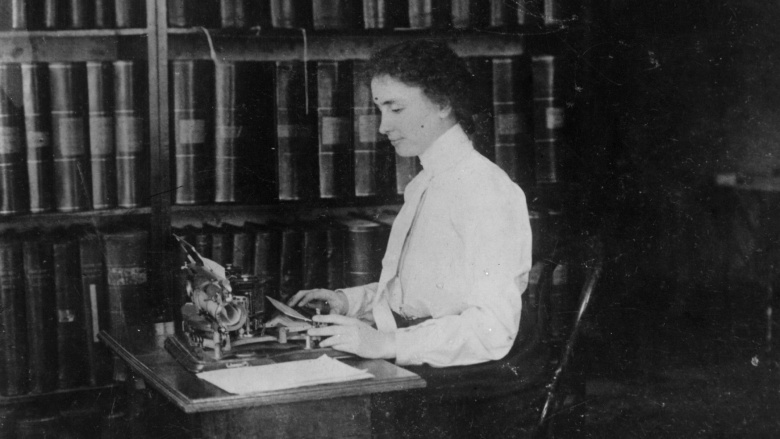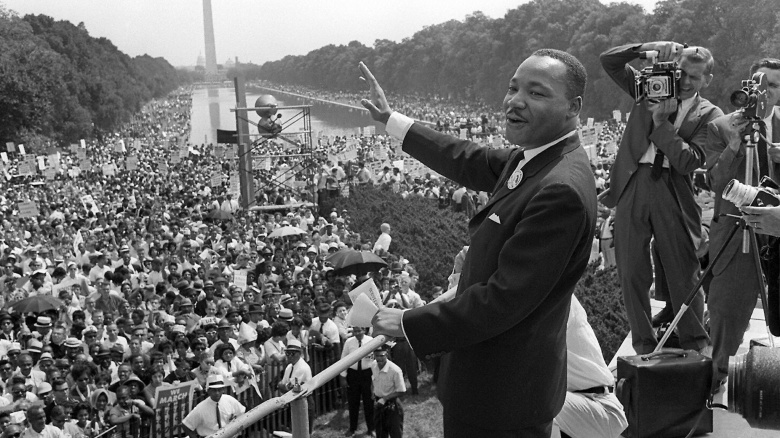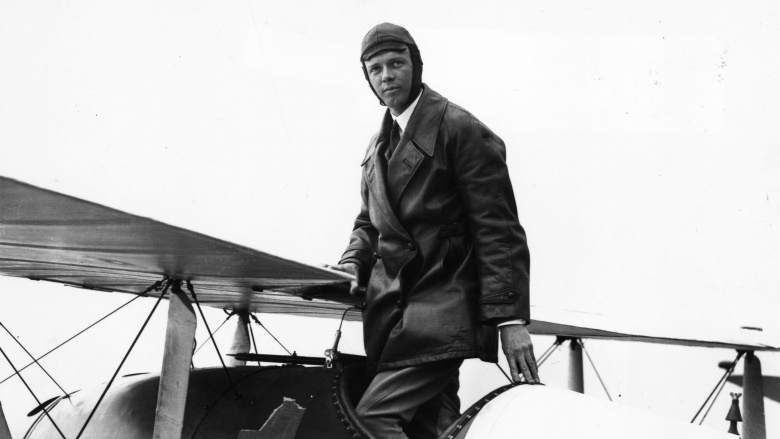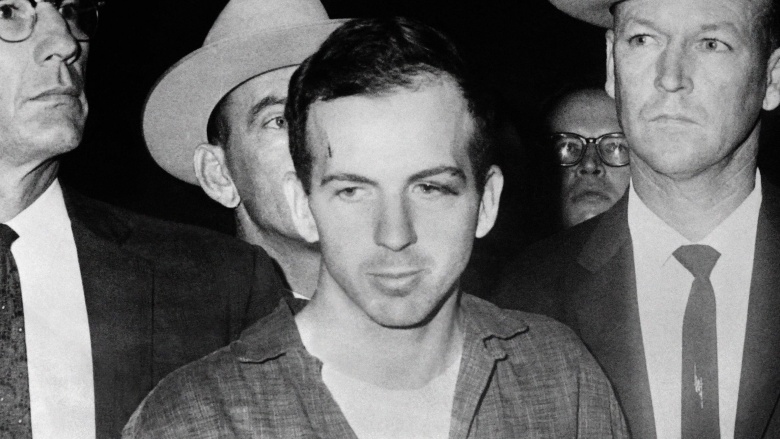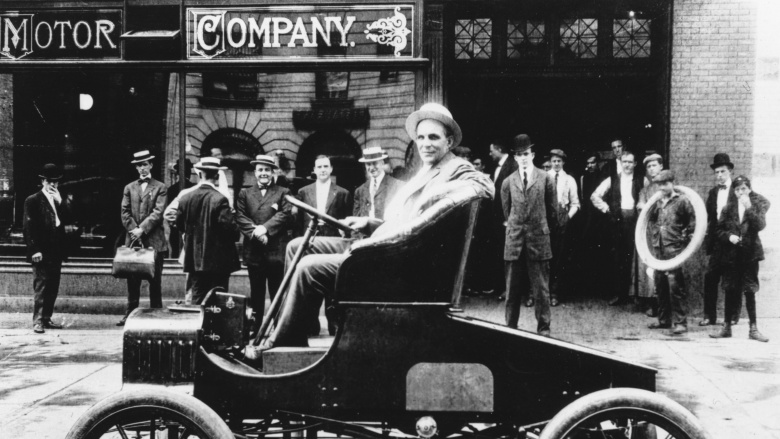Things Almost No One Knows About These Famous Americans
American history is full of notable, colorful figures. Yet, with over 200 years of history, some aspects of these individuals' lives and personalities may be forgotten. Sometimes it's because what they're famous for overshadowed everything else, and sometimes these factoids are so embarrassing or politically inconvenient, it's prudent for most people to ignore them and avoid talking about them. We're not most people...
Helen Keller: Communist social crusader
Most of us know the story of Helen Keller's early life through the theatrical play and three movies entitled The Miracle Worker. Her story is awe-inspiring for demonstrating how people can overcome even the most extreme disabilities, but you don't hear much about Keller's life after her miracle. That's probably because her adult life didn't gel well with America's anti-socialist and anti-communist sentiment, of which she fervently did not agree.
Keller read the works of Karl Marx after college, which inspired her to later join the Socialist Party. She continued to be a tireless advocate of the disabled in the United States, and also supported women's suffrage, birth control, and the National Association for the Advancement of Colored People (NAACP). She was against World War I because she felt it was only fought to help the interests of capitalists. She further stressed her anti-capitalist beliefs in a letter to Wisconsin Senator Robert M. La Follette in 1924. "[W]hen it comes to a discussion of poverty, and I maintain that it is the result of wrong economics—that the industrial system under which we live is at the root of much of the physical deafness and blindness in the world," Keller wrote.
These positions, in her day, were more than slightly controversial. They brought her to the FBI's attention, which put her under surveillance for most of her life. It's unfortunate that Keller's adult life is not more widely known by the public — even if you disagree with her championing socialist/communist principles, her passionate work only further cements the fact that she was much more than her disabilities.
Martin Luther King, Jr: anti-Vietnam activist
Most of us rightfully admire Dr. Martin Luther King, Jr. for his crusade against segregation and overall pursuit of equality for all races in the United States. Less remembered, and even less frequently taught, is that Dr. King was passionately, and controversially, against the Vietnam War.
In a 1967 speech entitled "Beyond Vietnam," Dr. King called for an end to the U.S. military's involvement in the southeast Asian country. "Now they languish under our bombs and consider us, not their fellow Vietnamese, the real enemy. They move sadly and apathetically as we herd them off the land of their fathers into concentration camps where minimal social needs are rarely met. They know they must move on or be destroyed by our bombs," said King in the speech. King thought it was particularly wasteful for the U.S. to spend its national treasure overseas, when it could be using those funds to promote domestic programs at home.
King's remarks were deemed so radical, 168 newspapers denounced him within a day, as did numerous civil rights groups. President Lyndon Johnson, who had King's support for his administration's civil rights initiatives, felt particularly slighted, and disinvited King to the White House. As with Helen Keller, even if you disagree with King's rhetoric against the Vietnam War, his speech nevertheless demonstrates his unrelenting courage to call our what he saw as injustice, even if his views were not at all politically popular.
Charles Lindbergh: controversial isolationist
In May 1927, Charles Lindbergh became an American hero when he made the first solo, non-stop flight across the Atlantic Ocean from New York to France in his plane, the Spirit of St. Louis. His fame unfortunately led to the kidnapping and death of his young son in 1932. Lindbergh and his wife subsequently moved to Europe in 1935 to escape publicity. While there, the U.S. asked him to visit Berlin and report on Germany's air force. In Berlin, Lindbergh received a warm welcome by members of Hitler's Third Reich. They admired him so much, Field Marshal Hermann Goering presented Lindbergh with the Service Cross of the German Eagle.
After returning to America in 1939, Lindbergh did everything he could to keep the U.S. from going to war with Germany. His general line of thinking seemed to be that Germany was unbeatable, and he was not afraid to resort to racial and anti-Semitic arguments to make his point. "These wars in Europe are not wars in which our civilization is defending itself against some Asiatic intruder ... This is not a question of banding together to defend the white race against foreign invasion," said Lindbergh in a radio address.
Lindbergh also thought that Jews in the United States were one of the chief voices pushing for war with Germany. In a 1941 speech, Lindbergh said: "Instead of agitating for war, Jews in this country should be opposing it in every way, for they will be the first to feel its consequences ... Their greatest danger to this country lies in their large ownership and influence in our motion pictures, our press, our radio and our government."
Granted, later in the speech Lindbergh said he "admired" the Jewish race, and decried the treatment of Jews in the Third Reich, yet he was simultaneously pumping anti-Semitic rhetoric into the national discourse during sensitive time. In the end, he flew more than 50 combat missions against Japan during World War II. Unfortunately, his odd non-interventionist, anti-Semitic crusade forever damaged his reputation as a national hero.
Lee Harvey Oswald: the time he tried (and failed) to assassinate somebody
Everyone knows the time Lee Harvey Oswald successfully assassinated a prominent public figure, but what most probably don't know, however, is the time earlier in 1963, when he tried to murder somebody else, and failed.
On April 10, 1963, Oswald shot a bullet into the Dallas home of Major General Edwin A. Walker. At the height of his thirty-year military career, General Walker commanded about 10,000 troops in Germany. He got into trouble with President Kennedy in 1961 after Walker, a fervent anti-communist, was found to have been dispensing right-wing propaganda to his troops. This rebuke led to Walker's resignation, but didn't end his right-wing crusades. He continued to be a thorn in the paw of the Kennedy administration. Most notably, in 1962, Walker was arrested for inciting violence during protests against racial integration at the University of Mississippi.
Oswald targeted him because Walker's notions were antithetical to his Marxist beliefs. Oswald, a trained marksman, shouldn't have missed the shot, but the windowpanes of Walker's study deflected the bullet and caused the projective to barely miss Walker, as the disgraced general sat at his desk. Nevertheless, Oswald had thought he killed Walker and admitted it to his wife, Marina. She later disclosed the entire incident to the FBI following President Kennedy's assassination, a fact that doesn't really help the cause of anybody who thinks Oswald was a patsy who couldn't possibly have taken down a President by himself.
Henry Ford: anti-Semite
Henry Ford is known for popularizing the automobile in the United States through the assembly line production methods he used at his Ford Motor Company. There is little doubt that Ford greatly contributed to America's prosperity, but there is also a dark side to his history: Ford held strong anti-Semitic views.
Most prominently, in 1918, Ford began publishing articles in his newspaper The Dearborn Independent, that claimed a Jewish conspiracy was afoot in the United States. According to one friend, Ford even perplexingly blamed World War I on Jews. Ford also published articles based on the Protocols of the Elders of Zion — a notorious Russian bit fake news still circulating today — that claims Jews are trying to rule the world. Henry Ford may have been a great industrialist, but there is little doubt that his anti-Semitic rhetoric contributed to, and likely exacerbated, existing prejudices around the world.
Walt Disney: no Communists in Disneyland
While making beloved animated classics like Pinocchio, Dumbo, and Bambi in the 1940s, Walt Disney also found time to fight what he perceived was a growing communist threat to the United States. Walt Disney, quite simply, detested communism. We're talking Snow White vs. Evil Queen levels of dislike.
In 1947, Disney testified to the House Un-American Activities Committee, which was investigating communist infiltrators in the American film industry. Although dozens of Hollywood celebrities came out against the Committee, Disney was an eager supporter of its investigation. He thought that key communist agitators in the motion picture industry were behind a strike by his animators. As if his testimony wasn't enough, Disney helped form the anti-communist group, the Motion Picture Alliance for the Preservation of American Ideals (MPA).
Walt Disney certainly deserves praise for proving the commercial viability of feature-length animated movies, but his fervent anti-communist stance only contributed to unwarranted hysteria about communism that would become the hallmark of McCarthyism.

